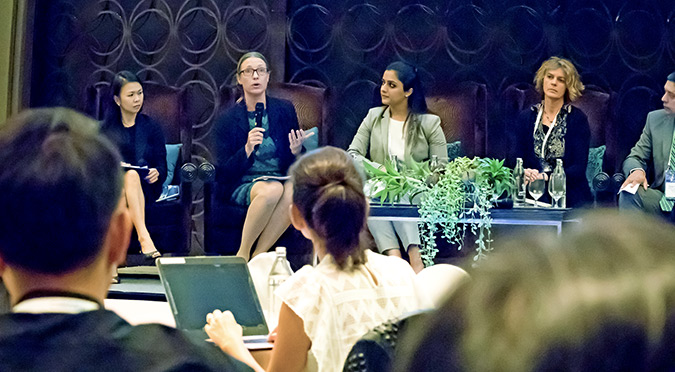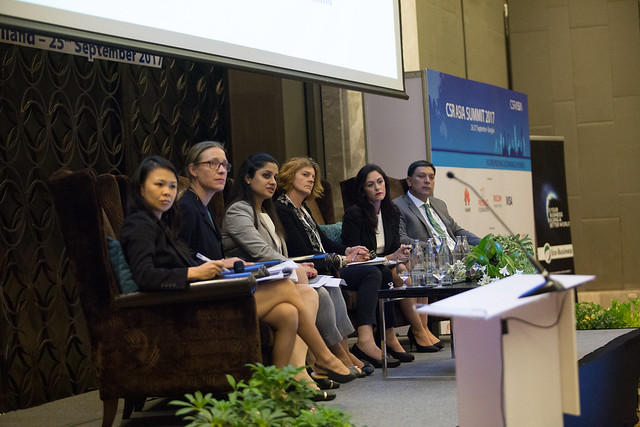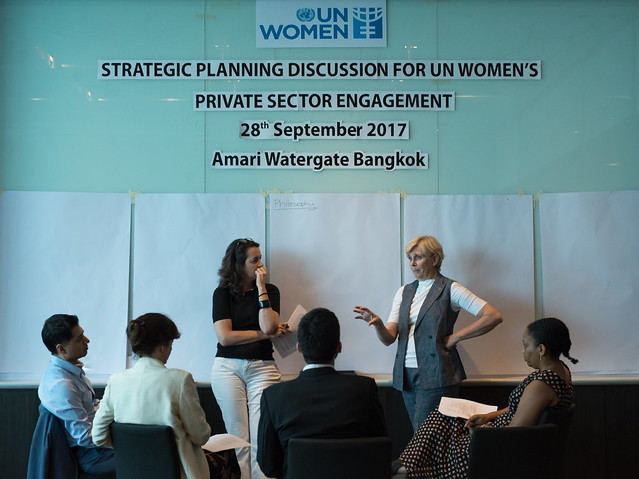By helping their female workers, companies in Asia also are helping themselves
Date:
Authors: Gabriela Mora and Yoomi Jun
Bangkok, Thailand — In 2016, the United Nations Secretary-General formed the High-level Panel on Women’s Economic Empowerment. The Panel, comprising leaders from governments, civil society, private businesses and international organizations, was tasked with creating a plan to speed up women’s economic empowerment worldwide and thus help to achieve the 2030 Agenda for Sustainable Development and its promise to “leave no one behind”. Earlier this year, the Panel identified seven changes needed to break the constraints on women’s economic empowerment; they include changes in the culture and practices of private businesses.

In collaboration with the Panel, UN Women Regional Office for Asia and the Pacific organized a dialogue on “How to Catalyze Business Action for Women’s Empowerment” at the CSR Asia Summit 2017, held in Bangkok on 26-27 September. (The summit is an annual conference on sustainable business practices in Asia.) Representatives from governments, civil society groups and businesses participated. The panelists agreed that by empowering their female workers, businesses can boost not only the women’s well-being but also the businesses’ bottom lines.
As Nathalie Gerschtein Keraudy, Managing Director of L'Oreal Thailand, said: Empowering women is not just the right choice for businesses; it is the smart choice.
Fiza Farha, an advisor to the Government of Punjab state in India, said: “There is clear evidence that women’s economic empowerment is not just a social issue anymore, that it makes commercial and economic sense.” However, it is not enough to just adopt new policies, she said--the private sector must actually carry out these polices. And education is needed to change mindsets in society.
Waqar Ahmad, Director and Head of Corporate Affairs of Nestlé Pakistan and Afghanistan, said the company was trying to attract more female workers by providing such benefits as daycare facilities, priority for women in parking spots, flexible hours, six months of paternity leave, and technical skills training for female workers. To make it all succeed, the male workers also must be trained, he said.“Training men is essential--they first need to understand why women have to be involved,” he said. “The work with men is the awareness and with women is to give them the opportunities.”
Madeleine Brasser, Development Sociologist at the international aid agency Oxfam, said the private sector gradually has come to accept the need to adopt policies to empower women. “At the beginning, they will ask you, ‘Why are you doing this?’ But at the end, they will ask you, ‘How are you doing this?’ ” she said.
Anna-Karin Jatfors, the UN Women Deputy Regional Director, said that key steps to economically empower women include changing sexist norms and laws, recognizing unpaid care work, and building women’s assets. "Businesses can affect positive changes for women not just within their own organizations but across their value chains,” she said.
After the CSR Asia Summit, UN Women representatives from around the region met with business leaders and experts to discuss ways to strengthen a regional strategy for working with the private sector on women’s economic empowerment.
Photo Gallery


For more information:
Please contact Alejandro Hita
Advocacy Officer and HeForShe Regional Campaign Coordinator
UN Women Asia and the Pacific
Tel: +66 2 288 2387
Email: alejandro.hita@unwomen.org